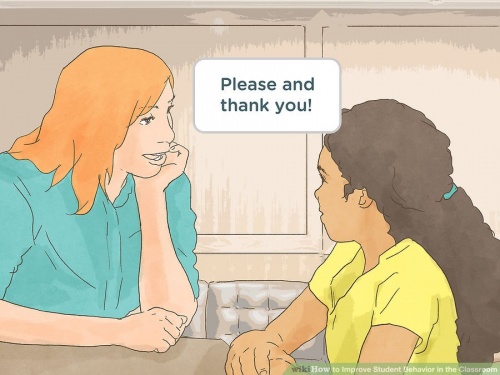Students’ behaviors in class
A teacher wrote to me: “How do you deal with students who are disrespectful and often disrupt the class? Please advise.
Answer: I rarely encounter any disruptive students in my class but I do know that there are complains among other teachers about students’ behaviors that are rude and disrespectful. My view is if the teachers care about students and can facilitate a positive learning environment when students are collaborating with others and interact with the teachers then the issue of disrupting behavior can be avoided.
On the first day of class, I share with my students about my personal view of being a professor, why I like to teach, why I choose to teach Computer Science at this school, and how my years working in the industry can provide them with many pieces of advice to help them build a successful career. I give them a specific list of behaviors that I would expect from them in the classroom such as come to class on time, be attentive during lecture, reading materials before coming to class, admitting mistakes quickly without blaming anyone, participate in class discussion and learning together etc. I also ask them about what do they want to learn in this class and what learning activities that they would like to have. We discuss together and come up with an agreement that I will teach them what they need and they will meet my expectation in class.
Occasionally, when students do not behave accordingly, I would remind them that we have an agreement. If they continue to disrupt, I will ask them to leave the class and discuss the disruptive behavior with them privately after class. I describe what actions I find disruptive, ask if them why this has a negative effect on me, on them, on their classmates, and then tell them not to repeat that behavior in the future. Most students respond positively to these quietly and calming conversations. But if the disruption becomes a persistent behavior then I confront it directly and tell the students that they are not in control of the class but I am. And it shows other students that I will take action to protect their learning. This also sends a clear message to the disruptive students that either they follow the rule or leave the classroom and do not come back.
I believe that students often misbehave when they are bored and cannot sit quietly for long. But in my class, I spend little time for the lecture but most of the time for discussion so I always keep students busy. Most discussion sessions are challenging, require them to listen and thinking deeply . I tell the students openly that I know my questions are difficult but I believe they are all capable of answering them. When they are listening, thinking, processing the information they are learning. Many students come into my class believe that they cannot do this but I will not accept that. I tell the class that they go to class to learn and the only way to learn is to listen, ask questions, process the information, and give answers. I monitor students to identify who is not participating and call their name to make sure that they will participate. As long as they can answer the question, they will gain more confidence and eventually, we have a positive learning environment. Of course, in the beginning, I will start with easier, achievable questions and allow them opportunities for collaboration with friends before giving the answer. I also give feedback that includes a clear explanation of what is correct and what is not.
In my view, some students go to college with bad behaviors because they have seen many bad behaviors from others, from their street where they come from, or even from their families. As teachers, we can respond to their behavior by either threatening them or by having a compassion toward them. If we react and get angry then we will get to an argument in class. Of course, we could use our authority to punish them but students’ behavior will not change because there will be more bad behaviors later. But by explaining to promote the qualities deeply in our students’ psyche such as their capacity for learning, their desire for integrity, their appetite for knowledge then the situation can be reversed. Students behavior will change if they know you care for them.
Sources
- Blogs of Prof. John Vu, Carnegie Mellon University
